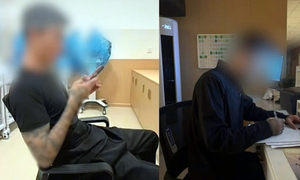Most of the victims of the tragedy, the deadliest in Iraq since the US-led invasion more than two years ago, were women, children and the elderly, hospital officials said.
Many of the dead drowned after falling off the Aaimmah bridge into the Tigris River in a surge of panic triggered by rumors that suicide bombers were in the crowd following the attack on the Shia shrine, officials said.
A security official said that the toll from the stampede stood at 647 dead and 301 injured, adding that the victims drowned, were suffocated or trampled to death.
The incident could further stoke tensions between the country''s Shia majority and the ousted Sunni elite behind the raging insurgency, with deep divisions lingering over the country''s post-Saddam Hussein constitution.
Piles of shoes of the victims littered the bridge, where the waist-high concrete barriers designed to foil car bombers were stained with the blood of victims.
Bodies of injured victims lined the corridors of Baghdad''s hospitals as they struggled to cope with the enormity of the disaster.
"The crowd started to panic and women and children were being trampled underfoot," said Abdel Walid, 54, lying dazed on a hospital floor. "My son was on my shoulders, I don''t know where he is now - everybody was suffocating to death so I eventually had to jump."
The stampede occurred after the Kadhimiya mosque came under mortar fire, leaving at least seven people dead and dozens wounded, as hundreds of thousands massed for a ceremony commemorating the death of a revered Shia figure, Imam Moussa Kazim.
"The attacks are terrorist ... who fired the mortars? Who spread panic among pilgrims on the bridge?" said health minister Abdel Mutalib Mohammed Ali, who demanded the resignation of the interior and defense ministers that he blamed for the tragedy.
Prime Minister Ibrahim Jaafari, a member of the majority Shia community, declared a three-day mourning period, state-owned Iraqia television said, giving the numbers gathered at the mosque at close to 1 million.
Ali also told Iraqia that there were several cases of poisoning "in places not immediately close to the attack spots ... but we asked people to refrain from taking food from anyone unknown to them".
Shias, long repressed under Saddam, have been one of the main targets of the Sunni-led insurgency. In March last year more than 170 people were killed in almost simultaneous attacks in Karbala and Baghdad mosque as faithful Shias marked a religious festival.
The US military said that helicopters had fired on suspected rebels who carried out the mortar attack and sent ground units to the area to assist in tracking down those responsible. A dozen individuals were detained for questioning.
"Many women and children were crying as panic broke out after the attacks," said an Iraqi army officer.
Six other people were wounded when gunmen opened fire on Shia pilgrims in Baghdad''s Adhamiyah neighborhood on their way to the Kadhimiyah shrine, an interior ministry source said.
The tragedy came amid deep divisions in the country over Iraq''s draft constitution, which is opposed by disgruntled Sunni Arabs who are now seeking alliances to defeat the charter in an October 15 referendum.
US Ambassador Zalmay Khalilzad hinted that the draft constitution, presented to parliament on Sunday after weeks of tortuous negotiations that failed to bring the Sunnis on board, was still an incomplete document.
"If Iraqis amongst themselves, in the assembly and, of course, from outside, decide to make some adjustments to the draft that was presented two or three days ago, it is entirely up to them," he told reporters.
"I believe that a final, final draft has not yet been - or the edits have not been - presented yet, so that is something that Iraqis will have to talk to each other and decide for themselves."
The Sunni leaders, who are mobilizing the community to strike alliances across the sectarian divide, said that they were opening talks with radical Shia cleric Moqtada Al Sadr.
Sadr, who has said that he rejects any constitution drafted under the US-led occupation, enjoys widespread support among poor urban Shias. His militia led one of Iraq''s fiercest rebellions against US-led forces last year.
On Tuesday the US military launched airstrikes on suspected Al Qaeda hideouts near the Syrian border, killing at least 56 people according to a security source.
The US military said that it had no exact number of casualties, but claimed that three strikes targeting "terrorist safe houses" were thought to have killed Abu Islam, a reported Al Qaeda operative, and several associates.
/AFP=Ammar Karim
<전교학신문>
Copyright ⓒ 세계일보. 무단 전재 및 재배포 금지
![[설왕설래] 담배 소송](http://img.segye.com/content/image/2026/01/15/128/20260115518642.jpg
)
![[기자가만난세상] 이 배는 여전히 테세우스 배입니다](http://img.segye.com/content/image/2026/01/15/128/20260115518568.jpg
)
![[세계와우리] 관세 너머의 리스크](http://img.segye.com/content/image/2026/01/15/128/20260115518628.jpg
)
![[기후의 미래] 트럼프를 해석하는 우리의 자세](http://img.segye.com/content/image/2026/01/15/128/20260115518573.jpg
)








